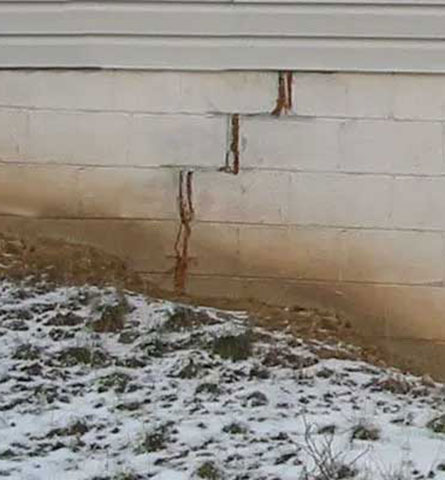9 undeniable signs that it’s time to call in the foundation experts
Any responsible homeowner should know when it is time to call in the experts for foundation repairs, as overlooking signs of a bad foundation allows that damage to get worse, resulting in costlier repairs down the road. Unfortunately, many homeowners don’t know how to tell if a crack is structural and in need of immediate patching, or small enough to ignore. They might also overlook many other signs of foundation damage rather easily, not realizing their home is trying to tell them that it’s time to call a foundation repair contractor!
To ensure you’re keeping your home in good condition, check out these 9 telltale signs that it’s time to call a foundation repair company near you. You might also make that call if you’re simply worried about small foundation cracks, discoloration, and other noticeable changes to basement walls or exposed concrete outside the home!
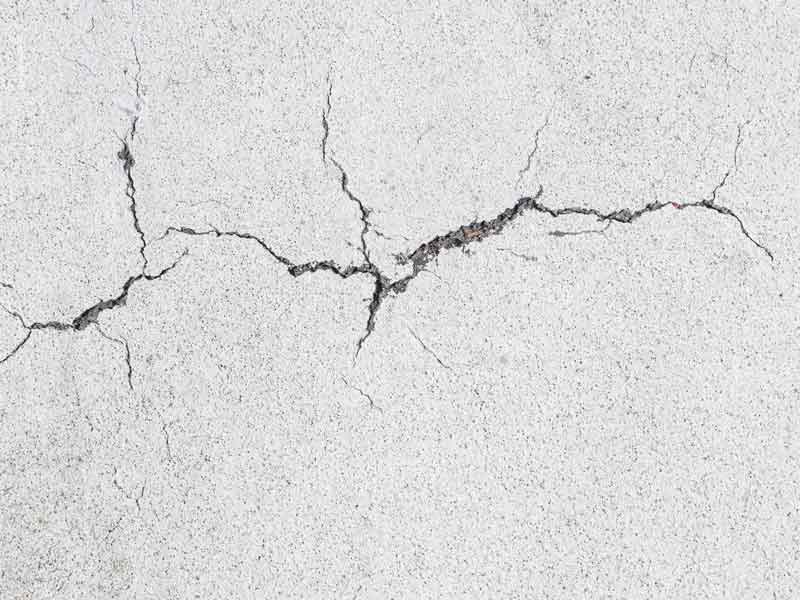
1. Interior Cracks? Call a Foundation Repair Expert!
A cracked or otherwise damaged and weakened foundation won’t hold up a home’s weight as it should. In turn, the home might shift in one direction or the other, or settle and sink along one side.
As the home’s framework shifts and moves, it pulls on interior walls and ceilings, leading to cracks and other visible damage. When the home settles along one side, inside walls and ceilings sag and sink with it, also leading to cracks along walls and ceilings. If there are water stains and musty odors with those cracks, this might indicate a plumbing leak; if not, it’s time to call a foundation repair expert near you!
2. Call a Foundation Repair Expert for Stuck Windows and Doors
As that weakened foundation shifts and settles, it pulls doorframes and window frames out of position, just as it does walls and ceilings. Once those frames are no longer level and even, doors and windows might then stick, refuse to open or close all the way or open on their own. You might also notice them creaking, groaning, or squealing as you move them; doorframes and window ledges might also be visibly uneven or outright crooked!
If you’ve been sanding down doors to get them to shut properly, adding soap to stuck windows, or other homemade remedies, call a foundation repair company instead. He or she can check for structural damage and note if you’ll need house leveling, to return frames to a level position.
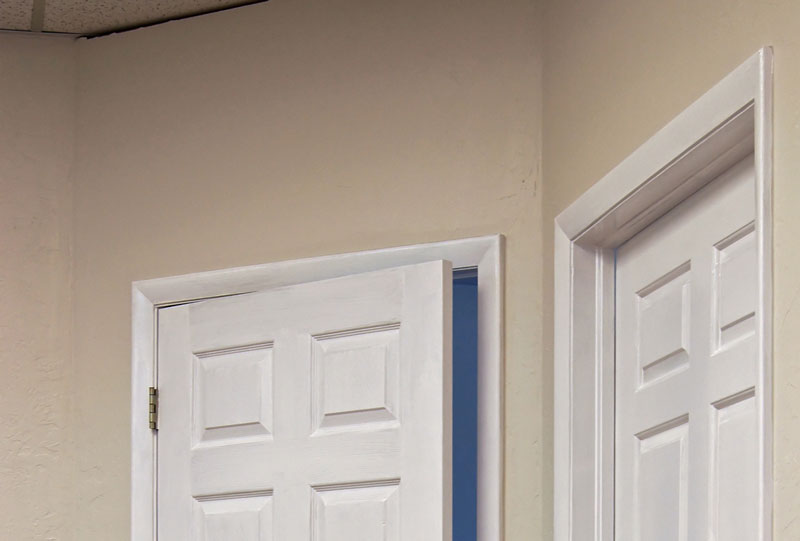
3. Bulging Floors Are Often Signs of a Bad Foundation
A sinking home or weakened foundation also means pressure on floors, which often shift out of their otherwise level and even position. When this happens, a floor’s weakest spots, usually in the middle of a room, tend to crack; as one side sinks down, the other side might then bulge upwards.
While bulging floors are sometimes harder to detect underneath thick carpet or tile, don’t overlook cracked grout and individual tiles shifting out of place. The carpet might also “bunch up” in certain spots or feel like it’s pulling away from the subflooring under it. While poor-quality installation can result in loose tile and carpet, these are also signs of a bad foundation, so call a foundation repair company if you notice flooring problems inside your home.
4. Gaps Around Molding Might Indicate a Bad Foundation
Cracks in the middle of walls and ceilings are not the only sign that those surfaces are moving out of place. As walls shift with a damaged, weak foundation, they might pull away from each other so that gaps form in the corners of interior rooms.
Crown molding and baseboards might also pull away from walls and floors. You might notice these pieces popping out in various spaces or see cracks running along their edges. Rather than just patch over those cracks or reattach them to the walls, call a foundation repair contractor near you!
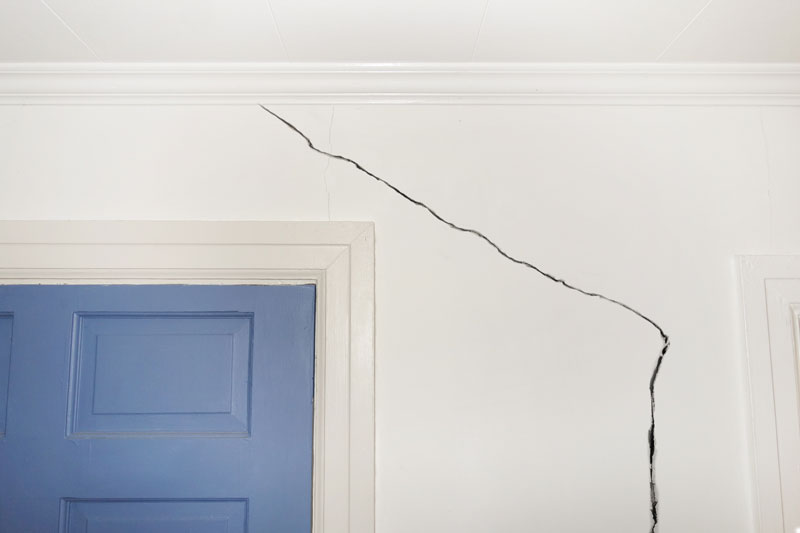
5. Excess Basement Moisture? Call a Foundation Repair Contractor
Remember that your home’s basement sits underground, and those lower soil layers are typically very damp. A strong foundation keeps out that moisture; foundation cracks, however, means trapped humidity and even standing water inside the basement.
Never assume that a damp, musty basement is just normal, or set up a dehumidifier without checking the home’s foundation first. A foundation crack is serious when it allows moisture and dampness into the home and those cracks should be addressed and patched as needed, rather than simply removing excess moisture.
6. Check Basement Walls for Signs of a Bad Foundation
Excess moisture coming in through foundation cracks will affect concrete basement walls. You might notice surface cracks or what is called spalling, which is peeling and pits along concrete surfaces. Basement walls affected by excess moisture also tend to bow or bulge over time.
A white powdery substance, called efflorescence, also indicates a bad foundation. This powder forms when salts migrate to the surface of concrete, often caused by excess moisture which then dissolves those salts and their concrete binders. Don’t assume that substance is household dust but call a foundation repair expert for a full inspection instead!
7. Serious Foundation Cracks Affect a Home’s Interior Insulation
Cracks along a foundation as well as the home’s walls and other surfaces let out your heated and cooled air, while also letting in heat, cold, and humidity from outside the home. In turn, you might notice a hot and stuffy environment in summer months and sudden cold drafts during wintertime.
Since those cracks and leaks are letting out heated and cooled air, your home’s HVAC system might then cycle on more often than usual and stay on longer than it should. The furnace filter might then get dirtier sooner than average, and your utility bills will likely spike! If you cannot explain those increased utility costs by way of a rate hike, poor-quality insulation, or unseasonal weather, have the home’s foundation and walls checked for cracks and other damage.
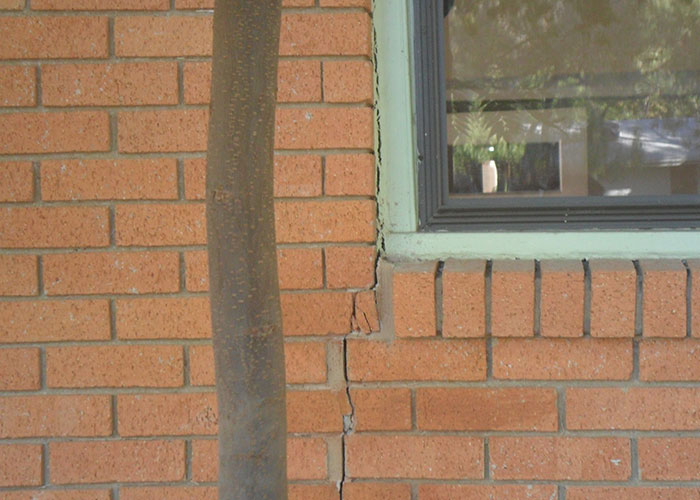
8. Check the Chimney Stack for Signs of a Bad Foundation
Settling and shifting home means pressure on a chimney stack, just as with interior walls and other surfaces. As the home settles in one direction or another, this also puts pressure on the chimney stack; if the home’s foundation is not level and even, that stack will likely sag or lean. You might also notice cracks along with its bricks or the mortar between them.
9. Plumbing Issues Can Mean It’s Time to Call a Foundation Repair Expert!
As with your home’s framework and interior spaces, a sinking and shifting foundation puts pressure on plumbing pipes and connectors. Many homeowners don’t realize that plumbing pipes are typically installed at a very slight angle, to encourage water to flow slowly and take the solid waste with it. If pipes sink too far in one direction, water might flow too fast to move solid waste along, and clogs then form.
Pressure on pipes and connectors can also mean cracks and separation, leading to leaks. Those leaks spike your water bills, damage framework, and increase the risk of interior mold growth. If you notice recurring plumbing problems in your home, have the foundation checked for damage or weakness.
When Is a Foundation Crack Serious?
Exterior cracks are the most obvious sign of needed foundation repairs, but hairline cracks along with a brick and concrete faces are common and not necessarily dangerous. Since hairline cracks don’t typically need patching or indicate structural damage when are foundation cracks and those forming along outside walls serious?
Some foundations will have an L-shape, such as to step down and follow a hill. Cracks forming around this L-shape, especially if they get smaller and become something of a hairline crack, aren’t typically structural and might not need repairs. However, you might plug or patch them anyway, to keep the basement dry and reduce the risk of those cracks getting larger.
Stair-step cracks along mortar or masonry joints often indicate structural concerns. These cracks form in the mortar between bricks or concrete blocks as if they’re going down a flight of stairs. If those cracks are wider than 1/4 inch and especially if you see the wall bulging along those cracks, it’s time to call a foundation repair contractor near you!
Horizontal cracks and especially those more than 1/4 inch wide indicate pressure on the foundation, often from excessive freeze-thaw cycles. In many cases, you might need underpinning or even an entirely new foundation.
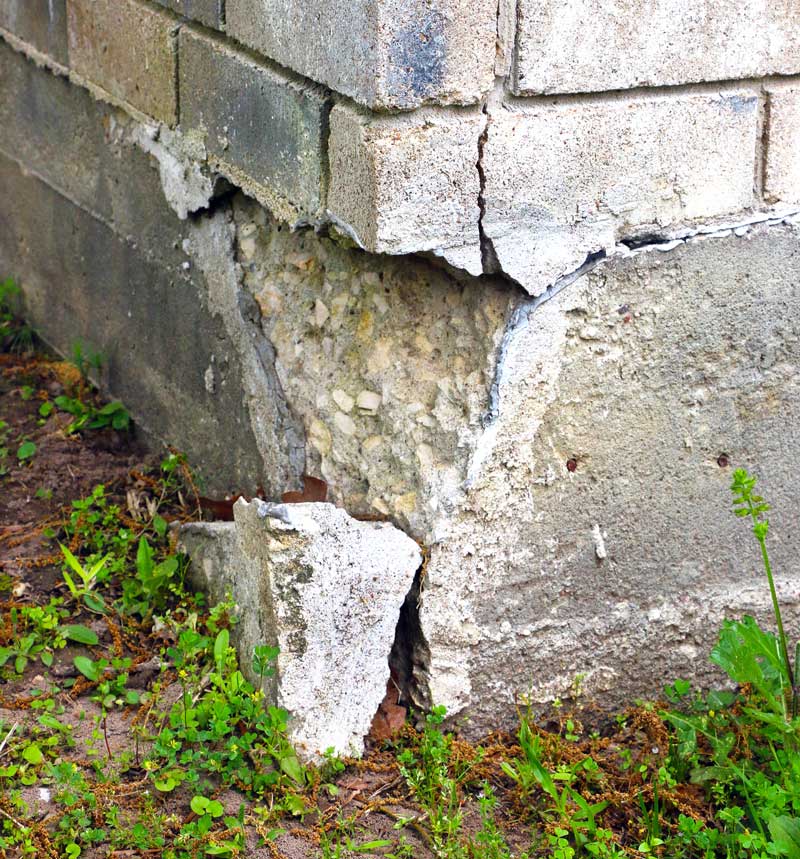
The Best Repair Methods for Foundation Cracks
Before repairing foundation cracks, it’s vital that homeowners address the underlying causes of a bad foundation. Excessive moisture collecting around the foundation is one of the most common reasons for foundation cracks and damage; your property might need better grading or improved irrigation, to direct water away from the home. Clogged gutters also allow rainwater to wash over their sides, so ensure the gutters are clean and sized properly for your home and local weather conditions.
For smaller cracks, a foundation repair contractor can inject epoxy meant for concrete and brick, at an average cost of $1500 to $3000 per property. That epoxy doesn’t provide much structural support but it will keep out water and reduce the risk of those cracks getting larger.
One choice for more substantial structural support includes wood or steel braces, attached to the inside of basement walls about six feet apart, at a cost of around $600 to $700 each. Wall anchors include two metal plates, one inside the home and one outside, attached by a large bolt that runs horizontally through the foundation wall. These anchors help keep the foundation securely in place, at a cost of about $500 each.
Severe foundation damage typically needs more than beams and bolts. Mud or slab jacking includes pumping a special slurry under a slab foundation, which then lifts the foundation back into place. Underpinning pushes beams or screws into the foundation, at a cost of $1200 to $1500 per beam.
A foundation repair contractor can tell you the right choice for your home, given its soil conditions, size, and foundation damage. Knowing when to call a foundation repair expert is the first step to ensuring your home is protected! If you notice any of these signs of needed foundation repair, call the foundation repair experts in San Antonio right away. Skillful Construction Foundation Repair can provide you with a full-scale inspection that will spot foundation damage and assess its risk to your home, so you can schedule patching or repairs as needed.

